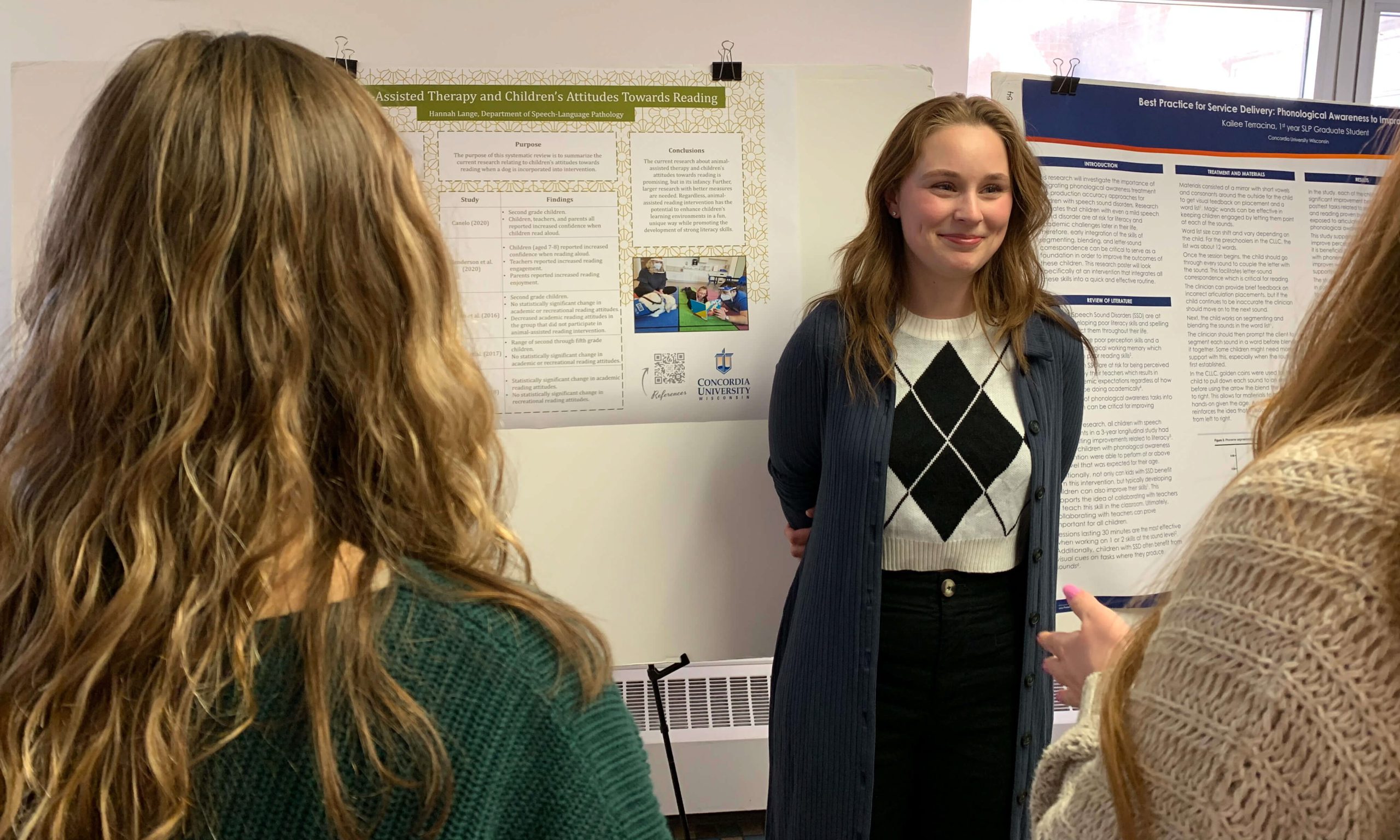
The CUW School of Health Professions’ Occupational Therapy and Speech-Language Pathology departments hosted a bi-annual evidence in medicine symposium during which students presented their semester-long research projects.
The symposium, which took place on Wednesday, was the culmination of a semester of work by CUW students and faculty. A total of 40 individuals presented, either in poster or podium formats. Presentations covered best practices and current research in medical, educational, and clinical settings across disciplines.
Students and faculty presented various topics
Poster presentations included:
Allison Heersink – Investigation of Weighted Vests as a Sensory Strategy in the School Settings
Audrie Seabaugh – Cognitive Behavioral Therapy and Trauma-Informed Care
Carissa Egelser – The Speech-Language Pathologists’ Role with Spelling in the School System
Charlotte Groth – Vision Therapy and Improvements in Oculomotor Dysfunction in Children with ADHD
Hannah Daso – Promoting Autistic Clients’ Self-Advocacy Skills
Hannah Held – Effects of Physical Activity on Cancer-Related Fatigue and Occupational Engagement
Hannah Himmelman – Multifactorial Interventions for Fall Prevention in Memory Care
Hannah Lange – Animal-Assisted Therapy and Childrens’ Attitudes Towards Reading
Jenna Conforti – Classroom teacher and Speech-Language Pathologist Interprofessional Collaboration to Reduce Language Disorder Misdiagnosis in Children who Use the African-American English Dialect
Julia Wol – Infant development, Bonding Attachment, and Infant Massage
Kennedy Beyersdorf – Promoting Positive Stuttering Attitudes and Identities During School-Based Intervention
Khloe Koch – Dementia-Friendly Environments and the Impact on Occupational Performance
Lauren Fox – Effects of Early Language Intervention on Literacy Skills in School Age Children
Maggie Majewski – Doing Articulation Differently: Best Practices for School SLPs Using the HIHR Model
Payton Godbold – The Lives of Littles after Loss: Childhood Grief, Occupational Therapy, & Play
Aidan Stumpf – Culturally relevant literacy intervention strategies for Native American children
Taylor Graf – History and Best Approaches to Reading and Literacy Instruction
Elizabeth Behling – Utilizing the Attention Span of Preschool Students
Kailee Terracina – Phonological Awareness to Improve Literacy
Kelly Verbeke – Improving Social and Emotional Outcomes for Adolescents Who Stutter: A Meta-Analysis
Megan Buchheit – SLP’s Role in Transition Planning Services for High School Students
Maddie Nimocks – Mindfulness-Based and Cognitive-Behavioral Therapies for Opioid Use Disorder
Lauren Fox – Effects of Early Language Intervention on Literacy Skills in Elementary School-Age Children
Podium presentations included:
Kevin Gries – Age and Sex Differences in Excercise Responsiveness
Michael Oldani – Biologics and the high costs of low prescribing: Initial Report
Mackenzie Knoten and Kelly Verbeke – Sequential-Oral Sensory (SOS) Approach to Feeding
Aubrey Buchholtz – Backward Chaining Method for Children with Apraxia of Speech: Single Case Study Design
Lauren Fox – Combining the Phonological Cycles Approach and the Complexity Approach for Children with Speech Sound Disorders
Grace Gundrum – Teaching Pragmatic Skills to Preschoolers with Language Impairments in an Early Childhood Classroom
Kallia Reske – The Role of SLP in Mild TBI Cases: Current Best Practices
Natalie Borst, Britton Godbold, and Kathryn Ousdigian – Ultrasound Therapy for Carpal Tunnel Syndrome
Special awardees
At the end of the symposium, the School of Health Professions awarded individuals whose presentations stood apart:
Kenzie Knoten and Kelly Verbeke, SLP, won an award for “EBP Master: Best use of evidence to inform clinical practice”
Kallia Reske, SLP, won an award for “Change Maker: The line of inquiry most likely to impact clinical practice”
Bob Barnhart, PT faculty, won the award for “Academic Showmanship: Most creative presentation of content” (special shout out to his dinosaur slide)
Want in?
The School of Health Professions offers a range of professional programs and degrees at the bachelor’s, master’s, and doctoral levels. Whether you pursue your education through online instruction or through classroom learning (at our home campus in Mequon or at our extension campus centers located statewide), you can expect a distinctive learning environment that will prepare you for a career marked by excellence, compassion, and service. Health Professions undergraduate students also participate in the Concordia Core, a rigorous, liberal arts curriculum integrated with Lutheran distinctives.